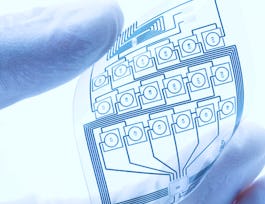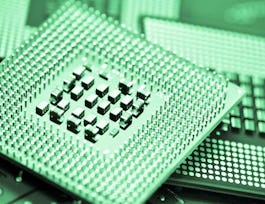Plastic electronics is a concept that emerged forty years ago, with the discovery of electrically conductive polymers. Ten years later, the first electronic devices using organic solids in place of the ubiquitous inorganic semiconductors were realised. The best achievement of plastic electronics is constituted by Organic Light-Emitting Diodes (OLEDs) that equip the display of many smartphones, and even TV sets.



(226 reviews)
Details to know

Add to your LinkedIn profile
6 assignments
See how employees at top companies are mastering in-demand skills


Earn a career certificate
Add this credential to your LinkedIn profile, resume, or CV
Share it on social media and in your performance review

There are 5 modules in this course
This first module is an introduction to the concept of semiconductor, which is the primary consituent of all electronic decives. We also show how some organic compounds can behave as semiconductors.
What's included
2 videos2 assignments
Electronic devives work through an electrical current generated by applying an electrical voltage. The process is controlled by charge carrier transport, descibed in this module.
What's included
3 videos2 assignments
Beside electrical properties, electronic devices also involve optical aspects, for example in light-emitting diodes and photovoltaic cells. This modulel describes the interactions of light with organic semiconductors.
What's included
2 videos
What's included
3 videos1 assignment
What's included
4 videos1 assignment1 peer review
Instructor

Offered by
Recommended if you're interested in Electrical Engineering

Google Cloud

Yonsei University

National Taiwan University

Politecnico di Milano
Why people choose Coursera for their career




Learner reviews
Showing 3 of 226
226 reviews
- 5 stars
70.79%
- 4 stars
23%
- 3 stars
3.98%
- 2 stars
0.44%
- 1 star
1.76%

Open new doors with Coursera Plus
Unlimited access to 7,000+ world-class courses, hands-on projects, and job-ready certificate programs - all included in your subscription
Advance your career with an online degree
Earn a degree from world-class universities - 100% online
Join over 3,400 global companies that choose Coursera for Business
Upskill your employees to excel in the digital economy
Frequently asked questions
Access to lectures and assignments depends on your type of enrollment. If you take a course in audit mode, you will be able to see most course materials for free. To access graded assignments and to earn a Certificate, you will need to purchase the Certificate experience, during or after your audit. If you don't see the audit option:
The course may not offer an audit option. You can try a Free Trial instead, or apply for Financial Aid.
The course may offer 'Full Course, No Certificate' instead. This option lets you see all course materials, submit required assessments, and get a final grade. This also means that you will not be able to purchase a Certificate experience.
When you purchase a Certificate you get access to all course materials, including graded assignments. Upon completing the course, your electronic Certificate will be added to your Accomplishments page - from there, you can print your Certificate or add it to your LinkedIn profile. If you only want to read and view the course content, you can audit the course for free.
You will be eligible for a full refund until two weeks after your payment date, or (for courses that have just launched) until two weeks after the first session of the course begins, whichever is later. You cannot receive a refund once you’ve earned a Course Certificate, even if you complete the course within the two-week refund period. See our full refund policy.


